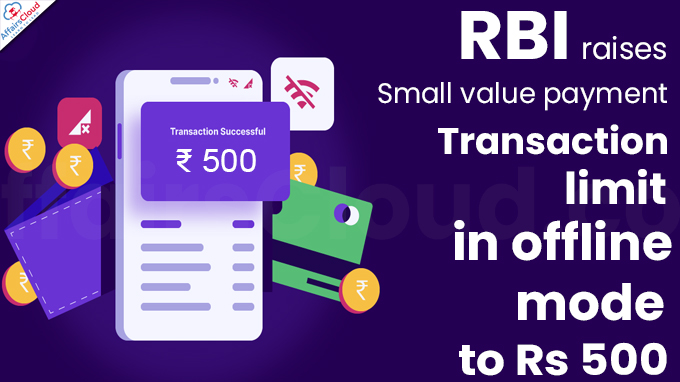 The Reserve Bank of India (RBI) increased the upper limit for offline transactions to Rs 500 from Rs 200 w.e.f. August 24, 2023, following its announcement during the bi-monthly policy review on August 10, 2023.
The Reserve Bank of India (RBI) increased the upper limit for offline transactions to Rs 500 from Rs 200 w.e.f. August 24, 2023, following its announcement during the bi-monthly policy review on August 10, 2023.
- However, overall limit is retained at Rs 2000 to contain the risks associated with relaxation of two-factor authentication.
- The information for the same was provided by RBI under Section 10 (2) read with Section 18 of the Payment and Settlement Systems Act, 2007 (Act 51 of 2007)/PSS Act.
About Offline digital payments:
Offline digital payments are Internet-free transactions, often for small amounts, by using means like National Common Mobility Card (NCMC) and UPI (Unified Payments Interface) Lite. The offline mode transactions can be facilitated through cards, wallets, and mobile devices, applicable to Authorized Payment System Operators (PSOs)/Payment System Participants (PSPs), including acquirers and issuers like banks and non-banks.
Reason behind this increase:
This decision to increase the transaction limit to Rs 500 from Rs 200 has been taken to encourage wider adoption of UPI (Unified Payments Interface) Lite. This will eliminate the need for multiple transactions for users. It also harnesses the new technologies for enhancing digital payments experience for users.
- UPI Lite is an ‘on-device wallet’ feature that will allow users to make real-time small-value payments without using a UPI PIN. It was launched in September 2022.
Background:
The RBI has set a cap of Rs 200 per transaction and a total limit of Rs 2000 for each payment method for small-value offline digital payments. This eliminates the requirement for two-factor authentication in these cases, making them faster, reliable, and contactless options for routine small payments and transit fares. However, there have been requests for these limits to be increased. Therefore, the above change has been made.
Who are PSOs/PSPs?
PSOs/PSPs are entities authorized by the RBI to operate payment systems enabling transactions between payers and beneficiaries.
- As per the PSS Act, a payment system is a mechanism facilitating transactions between payers and beneficiaries, encompassing clearing, payment, and settlement services, excluding stock exchanges. It covers various operations like credit/debit card, smart card, and money transfers.
Recent Related News:
i.It has issued a ‘Draft Circular – Arrangements with Card Networks for issue of
Debit, Credit and Prepaid Cards’ empowering the debit, credit, and prepaid card users in India with Card network portability w.e.f. October 1st, 2023.
ii.RBI cancelled the banking licence of two cooperative banks, Sri Sharada Mahila Co-operative Bank, Tumkur, Karnataka and Harihareshwar Sahakari Bank, Satara in Maharashtra.
About Reserve Bank of India (RBI):
Governor – Shaktikanta Das
Deputy Governors – Swaminathan Janakiraman, Michael Debabrata Patra, M. Rajeshwar Rao, T. Rabi Sankar
Establishment – 1st April 1935
Headquarters – Mumbai, Maharashtra




